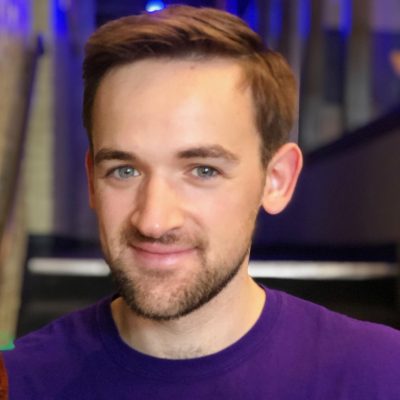Alumnus Spotlight: Nick Horvath, Ph.D. ’19

May 4, 2020
Nick Horvath, Ph.D. ’19, is an alumnus of the chemical engineering program at Cornell from which he holds a Ph.D. Now, as a computational scientist at Synlogic Therapeutics, he uses mathematical modeling to understand the mechanisms of diseases in the human body and the way that engineered therapeutics can make an impact for patients. This ties in well with his doctoral work in computational systems biology modeling, as well as two internships he had in the pharmaceutical industry.
What were essential factors in your industry transition?
My advisor Jeffrey Varner was supportive of me and other lab members pursuing summer internships. My first was with Novartis Institutes for BioMedical Research. I applied to dozens of positions on online job boards before receiving an offer from them, so my advice to others is to be tenacious and patient. The second was with Vertex Pharmaceuticals, through a connection who had interned there previously. It will surely be no surprise to anyone reading that having someone to vouch for you can be enormously helpful. These internships were tremendously valuable experiences professionally and personally. Many interviewers for full-time positions asked if I had any experience actually working in the field to which I was applying, and these went a very long way to demonstrating my potential to be successful in a potential role. They also provided valuable insight to me as to which industries and positions I might actually enjoy.
How long was your job search?
From beginning to end, my total job search time was just shy of 12 months. I actually started my search for a full-time position before beginning my second summer internship. After the internship, I spent the fall writing and defending my thesis. I was looking at opportunities throughout this time, and had intermittent periods of activity on the job front. I believe there was great value in starting early, because I learned so much about the application process, how to present myself, and what I truly wanted to do.
What advice do you have for others deciding whether to pursue academia or industry?
My advice for those still deciding between staying in academia or not is to be very honest with yourself about what you want. Consider not just the problems you want to work on, but the environment, the pace of work, how much you want to work independently versus on a team, and how much you want to get paid. While I cannot explicitly advise anyone against postdocs, of the academic or industry variety, I would recommend doing a lot of research about what they entail and what other options you may have. I am very glad that I was patient and determined enough to land the role that was right for me.
What advice do you have for others on taking steps during their Ph.D. programs to prepare for industry careers?
For someone who does want to pursue industry, especially right out of grad school, I think internships are very helpful. They allow you to demonstrate industry-ready skills and the ability to apply them to a company with a certain mission and bottom line. Internships will also assist you in developing a professional network that will be invaluable when you are looking for a permanent position. If you want to work in industry, I would recommend asking your advisor about interning and making a case based on your desire for professional development.
What other steps did you take prior to starting your career in industry?
Barring internships, or in addition to them, building and demonstrating relevant skills will give you a competitive edge. I independently pursued online, project-based data science and machine learning work. This complemented my graduate work and internship experiences and was very attractive to prospective employers.
Do you have advice for students preparing for interviews?
There are many great resources for interview advice once you make it to that stage, but a few things stand out to me from my own experience. First, connect your work to what the company does as much as possible. Employers generally do not care about what you have done, except insofar as you can relate it to their business. Early in my search I spent too much time preparing for in-depth technical questions when I should have been thinking about how to sell my experiences and myself as a fit for the role. Secondly, be confident. If you don’t believe that you can excel in the position, your potential employer definitely won’t. Finally, realize that this process relies on factors out of your control. Throughout my job search it seemed that timing was almost as important as qualifications. Put in the work to set yourself up for success, but don’t be too hard on yourself if it takes longer than you hope. With that, I wish everyone looking for employment the best of luck.

